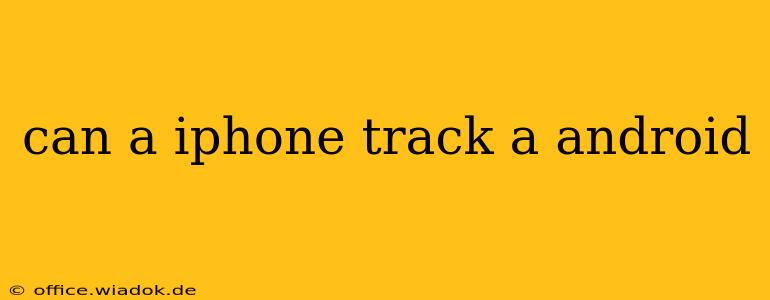The short answer is: no, an iPhone cannot directly track an Android phone without the Android user's knowledge and consent. There's no built-in Apple feature designed to stealthily monitor Android devices. However, the situation is more nuanced than a simple yes or no. Let's delve into the complexities.
Understanding the Limitations of Direct Tracking
Apple's iOS and Google's Android operate on fundamentally different systems. This inherent incompatibility makes direct, unauthorized tracking exceptionally difficult. Unlike some fictional scenarios depicted in movies, there's no secret Apple app or hidden iOS function capable of covertly monitoring an Android device's location or activity.
Indirect Tracking Methods: Where the Lines Blur
While direct tracking is improbable, indirect methods exist, though they require significant caveats and often involve the Android user's unwitting participation or cooperation:
1. Third-Party Apps and Services:
- Location Sharing Apps: Both Android and iOS users can utilize third-party apps (like Google Maps, WhatsApp, or Find My Friends) to share their location. If the Android user willingly shares their location with an iPhone user through such an app, tracking becomes possible. However, this is explicit consent, not covert surveillance.
- Family Tracking Apps: Similar to location sharing, apps designed for family tracking can monitor location data, provided all parties consent to its use. These are legitimate tools, not clandestine tracking mechanisms.
- Malicious Apps: This is the most concerning scenario. A compromised app on the Android phone could potentially transmit location data or other information without the user's knowledge. However, this isn't a feature of the iPhone itself but rather a vulnerability within the Android ecosystem. This highlights the importance of only installing apps from reputable sources and keeping your Android software updated.
2. iCloud and Shared Data:
If certain data is shared between devices (like photos or documents stored in iCloud), an iPhone user might indirectly infer information about the Android user's activities through this shared data. However, this isn't direct tracking; it's drawing inferences from already shared information.
3. Network Monitoring (Highly Improbable and Illegal):
Sophisticated network monitoring techniques could potentially reveal some information about an Android device's location or online activities. However, such methods are incredibly complex, resource-intensive, illegal in most jurisdictions, and require a significant level of technical expertise. Furthermore, they are not related to the iPhone's inherent functionality.
Legal and Ethical Considerations
Attempting to track an Android device without the owner's explicit consent is a serious violation of privacy and likely illegal. Such actions could lead to severe legal consequences.
Conclusion
While an iPhone cannot directly track an Android phone, the use of third-party apps, shared data, or malicious software opens up possibilities for indirect monitoring. Always prioritize responsible technology use and respect the privacy of others. The absence of built-in cross-platform tracking functionality emphasizes the importance of user consent and transparency in data collection and sharing. Remember, any tracking involving unauthorized access is unethical and potentially illegal.

